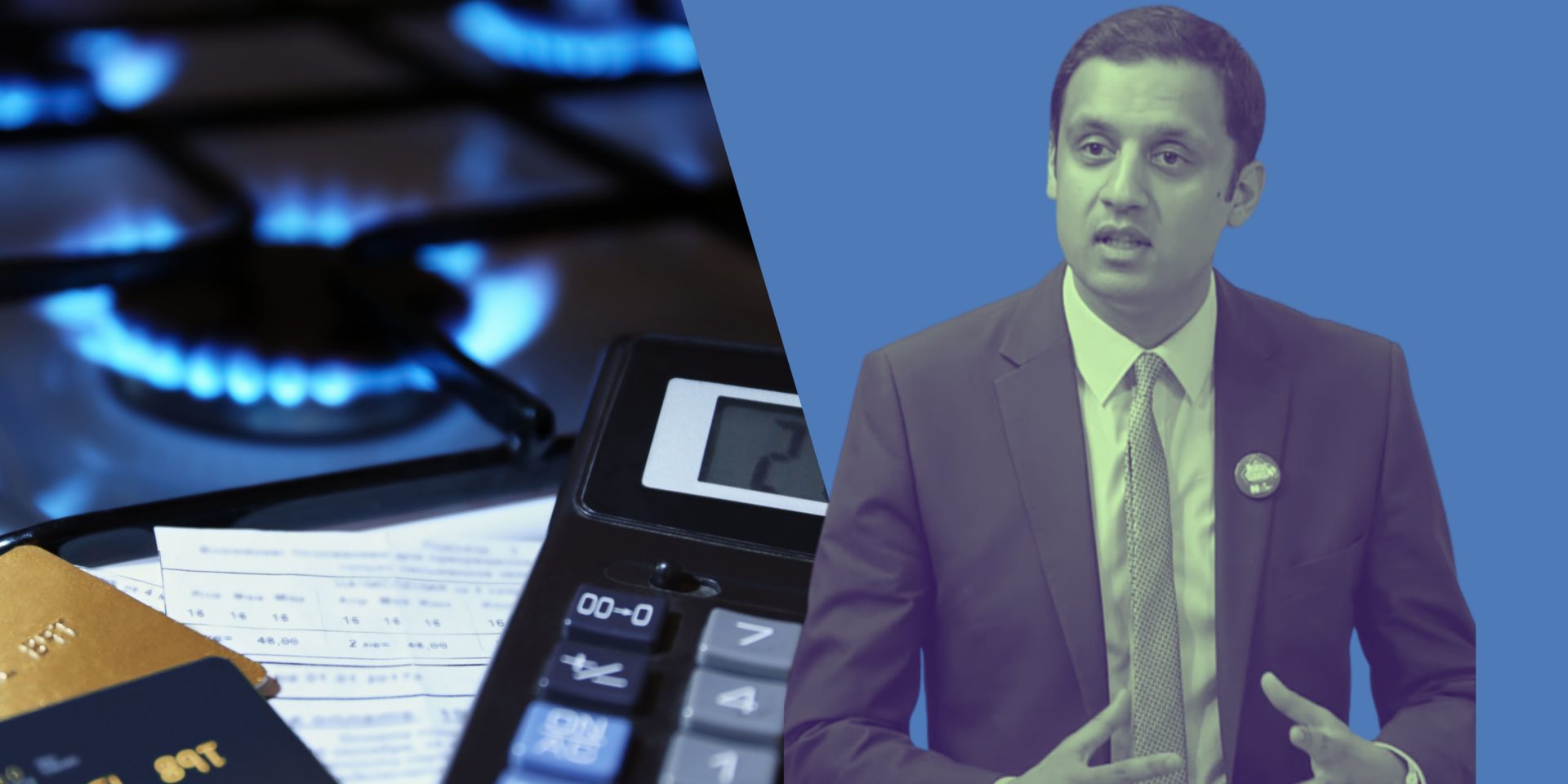As the cost of living crisis continues to bite a recent survey showed that 90 per cent of the public were concerned about rising prices.
The crisis was debated on the BBC’s Debate Night programme, with Anas Sarwar criticising the Scottish Government for not doing enough to help people in this country.
“Water charges are going up – a decision by the Scottish Government; rail fares are going up – a decision by the Scottish Government. We chose to take that money that came from the UK treasury and replicate the Rishi Sunak model of giving people £3.75 a week to help them with their bills.”
Ferret Fact Service looked at these claims.

Water and Rail Decisions
Claim: “Water charges are going up – a decision by the Scottish Government. Rail fares are going up – a decision by the Scottish Government.”
Water supply is provided by Scottish Water, a publicly-owned company. It is regulated by the Water Industry Commission for Scotland (WICS), and is answerable to Scottish Government ministers.
Water bills in Scotland are set yearly. In February 2022, Scottish Water announced water and waste water services charges would rise by 4.2 per cent in 2022-23.
Increases in charges are set within maximum limits set by WICS. Between 2021 and 2027 this is set at no more than two per cent higher than the Consumer Prices Index (CPI) which measures inflation.
Scottish Water said this increase would “mean an average bill increase of 31p per week”.
Those who receive discounts on council tax can also receive reductions in the cost of their water. The bills for both council tax and household water charges are collected at the same time.
Water supply is devolved to the Scottish Parliament, meaning the Scottish Government is ultimately in charge of decisions on Scotland’s water. The Scottish Government also has the power to mitigate increases in cost of living, as it has done with the £150 cost of living award, which reduced council tax bills.
Scotrail returned to full public ownership in April 2022, ending 25 years of privatisation.
Price rises are set by the Scottish Government. The latest price rise was announced by transport minister Graeme Dey in December 2021.
Peak and off-peak regulated fares were increased by 3.8 per cent, in line with inflation in July 2021’s retail price index (RPI). This is the highest increase since 2012.
Ferret Fact Service verdict: True
Sarwar is right to say that both rail fares and water charges are increasing, although both remain within levels of inflation. Both rail fares and water charges are devolved to the Scottish Government.

Replicating the Model
Claim: “ chose to take that money that came from the UK treasury and replicate the Rishi Sunak model of giving people £3.75 a week to help them with their bills.”
In this claim, Anas Sarwar is referring to the UK’s council tax rebate of £150, which was announced in February 2022 and came into effect in April.
This was part of a wider rebate, but the council tax refund applied to households in England in council tax bands A to D.
A similar scheme was announced by the Scottish Government, which also gave households in council tax bands A to D, or those who were eligible for council tax reductions, a £150 discount on council tax bills. This scheme, called the Cost of Living Award, did not directly take into account people’s earnings, and was a flat one-off rebate on council tax bills.
Sarwar’s claim the Scottish Government had given people “£3.75 a week” is calculated by dividing the £150 payment by 40 weeks, to approximate the 10 months that council tax bills are paid in each year.
The first part of the claim refers to the Scottish Government taking “money that came from the UK Treasury” to pay for the cost of living award. However, there was some controversy about whether the UK’s £150 payment would result in extra funding for the Scottish Government through the Barnett formula.
This stemmed from a difference between estimates for spending which were given to the devolved nations, and the final amount of money which came to Scotland through the Barnett formula.
The Barnett formula works by calculating increases or decreases in budgets for the devolved nations based on spending per person in England.
The UK Treasury confirmed to FullFact that due to the lower impact of the Omicron variant of Covid-19, health spending in England was lower than forecast. This means less money comes to Scotland through the Barnett formula than was estimated.
It appears this has offset the extra money which came to Scotland through the spending on the council tax rebate.
Ferret Fact Service verdict: Half True
Sarwar’s claim that the Scottish Government took money from the UK Treasury to “replicate the Rishi Sunak model of giving people £3.75 a week” lacks context. While it is true that Scotland’s cost of living award is similar to the UK’s, and offers the same discount on council tax, it appears that reductions in health spending mean Scotland did not get extra money to pay for it.

Photo Credit: iStock/StudioMars















The assumptions you made about extra money are wrong. Scot Gov would have lost money because of reductions in health spending. They then got extra money for the CT rebate scheme.
That the two cancel each other out is irrelevant. You have to compare what scot gov would have got workout the scheme, not what they got under a previous calculation.
Another case where Ferret twists the facts to suit it’s own agenda?